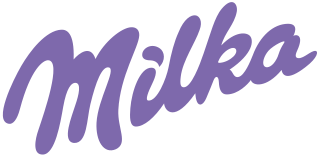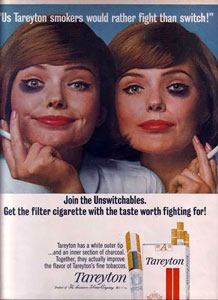
Advertising is the practice and techniques employed to bring attention to a product or service. Advertising aims to put a product or service in the spotlight in hopes of drawing it attention from consumers. It is typically used to promote a specific good or service, but there are wide range of uses, the most common being the commercial advertisement.
Advertising slogans are short phrases used in advertising campaigns to generate publicity and unify a company's marketing strategy. The phrases may be used to attract attention to a distinctive product feature or reinforce a company's brand.

Got Milk? is an American advertising campaign on television and YouTube encouraging the consumption of milk and dairy products. Created by the advertising agency Goodby Silverstein & Partners for the California Milk Processor Board in 1993, it was later licensed for use by milk processors and dairy farmers. It was launched in 1993 by the "Aaron Burr" television commercial, directed by Michael Bay. The national campaign, run by MilkPEP began to add the "got milk?" logo to its "Milk Mustache" ads in 1995.
In marketing, the unique selling proposition (USP), also called the unique selling point, or the unique value proposition (UVP) in the business model canvas, is the marketing strategy of informing customers about how one's own brand or product is superior to its competitors.

Whiskas is a brand of cat food sold internationally. It is owned by the American company Mars, Incorporated. It is available either as small meaty pieces in sauce, gravy or jelly packaged in tins, foil trays or pouches, as well as in the form of small biscuits sold in cartons or pouches and milk sold in small bottles. Its packaging has a recognisable purple color and a stylized silhouette of a cat's head.

Heinz 57 is a synecdoche of the historical advertising slogan "57 Varieties" by the H. J. Heinz Company located in Pittsburgh, Pennsylvania, United States. It was developed from the marketing campaign that told consumers about the numerous products available from the Heinz company.

Aero is an aerated chocolate bar manufactured by Nestlé. Originally produced by Rowntree's, Aero bars were introduced in 1935 to the North of England as the "new chocolate". By the end of that year, it had proved sufficiently popular with consumers that sales were extended throughout the United Kingdom.

Milka is a Swiss brand of chocolate confectionery, originally made in Switzerland in 1901 by Suchard. It has then been produced in Lörrach, Germany from 1901. Since 2012 it has been owned by US-based company Mondelez International, when it started following the steps of its predecessor Kraft Foods Inc., which had taken over the brand in 1990. It is sold in bars and a number of novelty shapes for Easter and Christmas. Products with the Milka brand also include chocolate-covered cookies and biscuits.
Copywriting is the act or occupation of writing text for the purpose of advertising or other forms of marketing. The product, called copy or sales copy, is written content that aims to increase brand awareness and ultimately persuade a person or group to take a particular action.

Kokanee is a beer brewed at the Columbia Brewery in Creston, British Columbia. Columbia Brewery began brewing Kokanee lager in 1959 and was purchased by the Labatt Brewing Company in 1974.

Glass milk bottles are glass bottles used for milk. They are generally reusable and returnable - used mainly for doorstep delivery of fresh milk by milkmen. Once customers have finished the milk, empty bottles are expected to be rinsed and left on the doorstep for collection, or rinsed bottles may be returned to a participating retail store. Bottle sizes vary depending on region, but common sizes include pint, quart or litre.
Per Lindstrand is a Swedish aeronautical engineer, pilot, adventurer and entrepreneur. He is particularly known for his series of record-breaking trans-oceanic hot air balloon flights and, later, attempts to be the first to fly a Rozière balloon around the Earth – all with British entrepreneur, Sir Richard Branson. He is also the founder of eponymous Lindstrand Balloons hot air balloon manufacturer based in Oswestry, England.
"Winston tastes good like a cigarette should" is an advertising slogan that appeared in newspaper, magazine, radio, and television advertisements for Winston cigarettes, manufactured by R. J. Reynolds Tobacco Company. Reynolds used the slogan from Winston's introduction in 1954 until 1972. It is one of the best-known American tobacco advertising campaigns. In 1999, Advertising Age included the "Winston tastes good like a cigarette should" jingle in its list of the 10 best radio and television jingles in the United States during the 20th century.

"Us Tareyton smokers would rather fight than switch!" is a slogan that appeared in magazine, newspaper, and television advertisements for Tareyton cigarettes from 1963 until 1981. It was the American Tobacco Company's most visible advertising campaign in the 1960s and 1970s.

The Milk Marketing Board was a producer-run product marketing board, established by the Agricultural Marketing Act 1933, to control milk production and distribution in the United Kingdom. It functioned as buyer of last resort in the milk market in Britain, thereby guaranteeing a minimum price for milk producers. It also participated in the development of milk products, introducing Lymeswold cheese. It was based at Thames Ditton in Surrey.
Roderick Howard Allen was a British advertising executive who wrote many well known advertising slogans and jingles used in the United Kingdom. He was nicknamed the "jingle king".

"The Age of the Train" was a television advertising campaign in the United Kingdom created by British Rail in the late 1970s to promote its InterCity rail travel service. The adverts were presented by DJ and BBC presenter Jimmy Savile and featured the then-new InterCity 125 high-speed train.

"Nice One Cyril" is a single by Cockerel Chorus written by Harold Spiro and Helen Clarke. The song title is a reference to Cyril Knowles, a left back who played for Tottenham Hotspur. It was released before the 1973 Football League Cup Final where Tottenham played Norwich City. It reached No. 14 on the British single chart after Tottenham won, and its writers Spiro and Clarke received an Ivor Novello Award for Best Novel or Unusual Song in 1974.

"Drinka pinta milka day" was an advertising slogan used by the British Milk Marketing Board and Dairy Council. It was coined by Bertrand Whitehead in 1958 as part of a campaign to counter the drop in milk sales following price increases after the 1956 withdrawal of government subsidies to milk producers. The slogan first appeared on posters in 1959 and remained in use until the late 1970s. It has been described as one of the most successful advertising slogans of all time, though the consumption of milk per person generally decreased over the period it was used. The slogan led to the word "pinta" becoming popular to describe a pint of milk.













